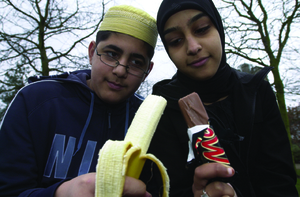Primary Times - the definitive what’s on and where to go family guide of activities and events for children of primary school age. Things to do with your kids during the school holidays including arts and craft activities, music and theatre for children, parties, competitions, days out, and family attractions along with term time drama schools, dance classes, after school clubs and sports activities. Things to do at a place near you!
Food for thought - Avon

As the government taxes sugary drinks and councils deploy a range of initiatives to tackle childhood obesity, Emily Potter explores how parents can inspire their children to eat healthily.
It’s school pick up time. The kids charge into the playground, excited to be out of the classroom, while the freedoms of home, the park or the console loom. Perhaps, the route home takes you past the supermarket or the sweet shop and the pressure to give in to those insistent requests for chocolate, gum or crisps is overwhelming.
Judging by figures outlined in the latest government initiative, too many parents are caving in to these requests with a third of children aged 2 to 15 either overweight or obese. Quite apart from the health risks to the children themselves, the costs of obesity to the NHS were an estimated £5.1 billion in 2014/15. In Bristol, official figures show that obesity and overweight at Reception level is 22.9% as compared to 22.1% nationally while, for Year 6, the Bristol data is 35.6% compared to 34.2% nationally.
The government’s 2016 ‘Childhood Obesity: a plan for action’ states that, “Younger generations are becoming obese at earlier ages and staying obese for longer.” Already, the government has introduced its much publicised sugary drinks tax, while local authorities have introduced campaigns in their regions.
Bristol deputy mayor Asher Craig, whose responsibilities include public health, says, “Two thirds of adults in the city are above a healthy weight and our children are the first generation predicted to live shorter lives than their parents due to diet and inactivity. Our focus is on ensuring this doesn’t come true.”
The city council and its partners are promoting healthy weight through initiatives such as ‘The Great Weight Debate’ and the ‘Sugar Smart Campaign’, designed to improve diet and exercise.
Asher explains, “We provide teaching resources, training and advice on improving health and wellbeing. Schools and nurseries can apply for the Healthy Schools Awards which include topic-based badges, with a focus on promoting health and wellbeing through best practice in schools.”
But no matter how strong the messages from the authorities, it’s the parents themselves who have to deliver these changes. Ensuring your child maintains a healthy lifestyle can be one of the greatest challenges of a parent’s daily life. Encouraging them to eat their greens, to switch that chocolate bar for an orange and go for a kick about instead of a game on the iPad can test the wits of the wiliest supermum or dad, especially when the youngsters dig their heels in.
Registered nutritional therapist Philippa Parish from Bristol says the causes of child obesity are complex, with contributing factors including the ‘grab and go’ culture around food, physical inactivity and “child power”.
“The emotional and mental effect of obesity is vast,” she says. “They include bullying, low self-esteem and ‘roller coaster’ blood sugar fluctuations. These lead to sugar cravings and can also effect concentration, creating feelings of irritation, aggression and anxiety.
“Healthy eating starts at home. The role of good nutrition needs more priority within the school curriculum and at government level, to empower parents and curtail the power of the food manufacturing industry.”
The key is to make the change at home first, and get the children into a healthy routine.
“Make fruit the only desert option and limit fried foods to a few times a month,” says Parish. “Simple cookery lessons in school encourage children to get used to handling ingredients, chopping up fruit and growing food such as cress in an egg shell, or a tomato plant on the window sill.”
Exercise plays an equally important role in a healthy lifestyle and encouraging children to be active can be great for their self-esteem. If the school involves a car journey, she says, “Park the car further away from the school and walk the last bit – even five minutes makes a difference. Get them a pedometer and keep a chart of steps taken, with regular (non-food) treats when they reach their goal. Parents can lead by example and take children for walks, or play games with them in the garden. They should negotiate television or computer time as rewards for activity time. Indoor games, such as hide and seek and bopping balloons are also great sources of exercise.”
As one North Somerset primary school teacher tells Primary Times, “In class we teach children about a healthy lifestyle including diet, and exercise. We look at balanced meals and nutrition and what they need to be healthy. Health checks are run in the school for Reception year and Year 6 and advisory letters are sent out to parents.”
But, she emphasises, the most successful approach comes from getting the children involved, encouraging them to think about how they eat and exercise.
“We get the children involved by asking them to do a food diary, collect their own data and analyse what they eat,” says the teacher, who prefers to remain anonymous. “We use the ‘Eat Well’ PVC mat to show what percentage of the food groups they need to have. It’s all about encouraging the right balance.”
She says that learning about children’s dietary needs can be a way to engage your child in their own lifestyle. “Let them pick out fruit and veg at the supermarket or encourage them to help you make dinner,” she advises. “It’s fun for the children, who become engaged in the process and want to eat healthily because they are involved themselves.”
Bath & North East Somerset Council W: www.bathnes.gov.uk/
Bristol City Council W: www.bristol.gov.uk/
Bristol City Councillor Asher Craig E: cllr.asher.craig@bristol.gov.uk
Philippa Parish Registered Nutritional Therapist W: www.livingwellness.co.uk E: info@livingwellness.co.uk T: 07460 930838







